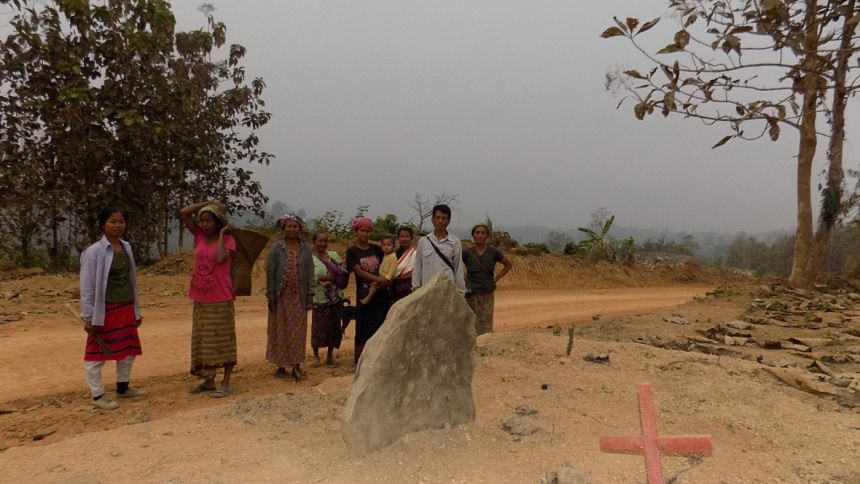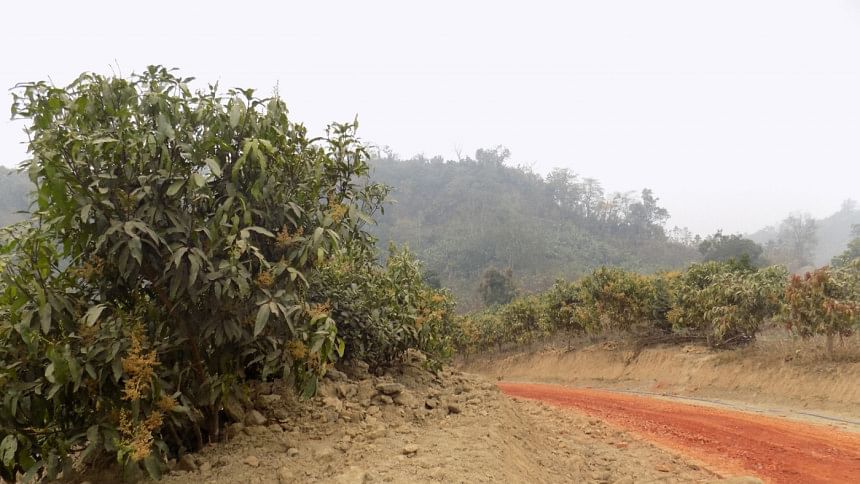Entrusted with development, it destroys hills, graveyard

Yet another development authority, Chittagong Hill Tracts Development Board (CHTDB), is allegedly flouting environmental laws of the country.
Without obtaining any approval from the Department of Environment (DoE), the CHTDB has allegedly razed at least twenty hills to the ground for building a road, 20 kilometres in length, between Rowangchhari and Ruma upazilas in Bandarban.
Moreover, at least ten graves in a graveyard, a huge number of trees planted by around fifty families and their Jhum house were also destroyed to make way for the road that is being built right through two remote villages -- Khamtang Para in Rowangchhari and Chanda Para in Ruma, said the villagers.
Surprisingly, under bylaws of the CHTDB, there is no room for monetary compensation for land or property acquisitioned or damaged by the CHTDB.

The CHTDB is constructing the road at a cost of Tk 48 crore after foundation stone of the work was laid on February 1, 2019 by Bir Bahadur Ushwe Sing, the minister for Chittagong Hill Tracts Affairs.
The affected families alleged that they were not offered any sort of compensation for the damage they incurred.
Rather, when they tried to raise objection to the destruction of their property, including the graveyard, workers of the contractor threatened them with severe consequences including demolition of the remainder of their property in the area and filing of criminal cases against the villagers.
Rowangchhari's Khamtang Para resident Menthon Khyang, 40, said the grave of his younger brother, Akhui Khyang, and graves of another 10 to 11 villagers were destroyed during the road work.
Alleging that the workers destroyed and desecrated their graveyard, Irin Khyang of the same area said, "They threatened us saying that all our houses in the Para will be demolished if we raise objection to government work."
The CHTDB destroyed their ancestral Jhum (agricultural) land where they grew turmeric, mango, banana and bamboo, said Shama U Marma, headman of Chanda Mouza in Ruma.
"When we tried to protest, they threatened us with filing of [criminal] cases... How would we survive in the hills without the Jhum?" he added.
Mong Nu Marma, from Chanda Para, said "The development board has damaged my Jhum house."
Khamtang Para resident Aung Thowai Khyang said, "Around twenty families in our neighbourhood were badly affected as the CHTDB destroyed their fruit gardens."
Expressing concerns for safety of the villagers, especially of their children and the elderly, Chai Thui Khyang of the village said since the road has left steep sides of partially cut hills while bisecting their village from end to end, the villagers have been subjected to fatalities and injuries due to landslides or road accidents.
"Our lives are in jeopardy now. We are feeling extremely unsafe," he also said.
Contacted, AKM Samiul Alam Kursy, senior chemist at DoE and the authorised DoE official overseeing its affairs in Bandarban, said, "We had been unaware of the hill cutting by the Chittagong Hill Tracts Development Board as they [CHTDB] did not seek any approval for the work from DoE."
Asked how the news of such a violation during a major road work, being carried out for over a year now, did not reach the DoE, he said the DoE is short-staffed and for that reason, they usually are not able to investigate an alleged violation unless they receive formal complaints.
Samiul however said, "We will look into the matter as soon as possible and take action against them [CHTDB]."
Cutting of hills without the approval of concerned authorities has been made prohibited under the Bangladesh Environment Conservation Act 1995, amended in 2000.
According to the law, a first offence of cutting hills without approval is punishable by imprisonment of up to two years or a fine of Tk 2 lakh or both. For a subsequent offence, the penalty is up to ten years' imprisonment, a fine of Tk 10 lakh or both.
Indiscriminate hill cutting is one of the major causes of landslides in hills, according to green activists and experts. In June 2017 alone, the CHT experienced massive landslides that claimed over 150 lives.
Zumlian Amlai, chairperson of Bandarban chapter of Parbatya Chattogram Forest and Land Rights Protection, an environmental rights advocacy organisation, said, "Over the years, many hills in Bandarban were destroyed through this practice. If it isn't stopped, the hills that still remain will surely disappear soon."
Commenting on building the new road at the expense of the environment as well as ancestral property of locals, he said, "The main beneficiary of this road will be stone thieves and illegal loggers."
With regards to providing compensation to the affected villagers, CHTDB Deputy Secretary Harunur Rashid confirmed that budgetary allocation for compensation against land acquisition is not permissible as per the CHTDB bylaws.
When this paper drew attention of CHTDB Project Director Abdul Aziz to the damage caused to ancestral property of locals, including their graveyard and orchards, during the construction of the road between Rowangchhari and Ruma upazilas, he admitted that some families were affected during the construction of the road.
"Although there is no provision for compensation from the Development Board, we are mulling over what can be done for the affected families," he added.

 For all latest news, follow The Daily Star's Google News channel.
For all latest news, follow The Daily Star's Google News channel. 



Comments